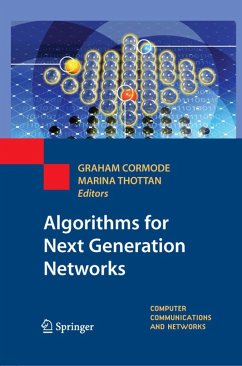
Computational Social Network Analysis
Trends, Tools and Research Advances
Herausgegeben: Abraham, Ajith; Hassanien, Aboul-Ella; Snásel, Vaclav

PAYBACK Punkte
57 °P sammeln!
Social networks provide a powerful abstraction of the structure and dynamics of diverse kinds of people or people-to-technology interaction. Web 2.0 has enabled a new generation of web-based communities, social networks, and folksonomies to facilitate collaboration among different communities.This unique text/reference compares and contrasts the ethological approach to social behavior in animals with web-based evidence of social interaction, perceptual learning, information granulation, the behavior of humans and affinities between web-based social networks. An international team of leading ex...
Social networks provide a powerful abstraction of the structure and dynamics of diverse kinds of people or people-to-technology interaction. Web 2.0 has enabled a new generation of web-based communities, social networks, and folksonomies to facilitate collaboration among different communities.
This unique text/reference compares and contrasts the ethological approach to social behavior in animals with web-based evidence of social interaction, perceptual learning, information granulation, the behavior of humans and affinities between web-based social networks. An international team of leading experts present the latest advances of various topics in intelligent-social-networks and illustrates how organizations can gain competitive advantages by applying the different emergent techniques in real-world scenarios. The work incorporates experience reports, survey articles, and intelligence techniques and theories with specific network technology problems.
Topics and Features: Provides an overview social network tools, and explores methods for discovering key players in social networks, designing self-organizing search systems, and clustering blog sites, surveys techniques for exploratory analysis and text mining of social networks, approaches to tracking online community interaction, and examines how the topological features of a system affects the flow of information, reviews the models of network evolution, covering scientific co-citation networks, nature-inspired frameworks, latent social networks in e-Learning systems, and compound communities, examines the relationship between the intent of web pages, their architecture and the communities who take part in their usage and creation, discusses team selection based on members' social context, presents social network applications, including music recommendation and face recognition in photographs, explores the use of social networks in web services that focus on the discovery stage in the life cycleof these web services.
This useful and comprehensive volume will be indispensible to senior undergraduate and postgraduate students taking courses in Social Intelligence, as well as to researchers, developers, and postgraduates interested in intelligent-social-networks research and related areas.
This unique text/reference compares and contrasts the ethological approach to social behavior in animals with web-based evidence of social interaction, perceptual learning, information granulation, the behavior of humans and affinities between web-based social networks. An international team of leading experts present the latest advances of various topics in intelligent-social-networks and illustrates how organizations can gain competitive advantages by applying the different emergent techniques in real-world scenarios. The work incorporates experience reports, survey articles, and intelligence techniques and theories with specific network technology problems.
Topics and Features: Provides an overview social network tools, and explores methods for discovering key players in social networks, designing self-organizing search systems, and clustering blog sites, surveys techniques for exploratory analysis and text mining of social networks, approaches to tracking online community interaction, and examines how the topological features of a system affects the flow of information, reviews the models of network evolution, covering scientific co-citation networks, nature-inspired frameworks, latent social networks in e-Learning systems, and compound communities, examines the relationship between the intent of web pages, their architecture and the communities who take part in their usage and creation, discusses team selection based on members' social context, presents social network applications, including music recommendation and face recognition in photographs, explores the use of social networks in web services that focus on the discovery stage in the life cycleof these web services.
This useful and comprehensive volume will be indispensible to senior undergraduate and postgraduate students taking courses in Social Intelligence, as well as to researchers, developers, and postgraduates interested in intelligent-social-networks research and related areas.













